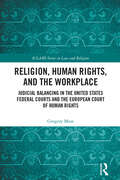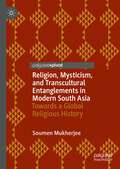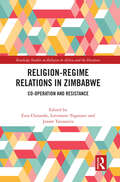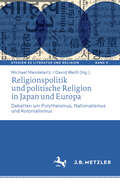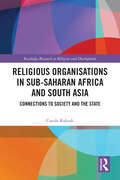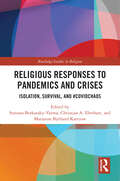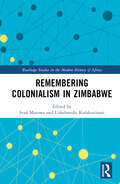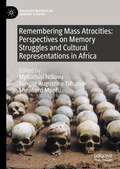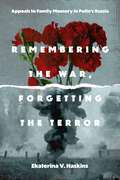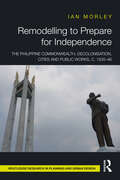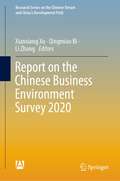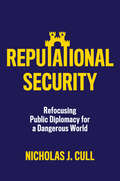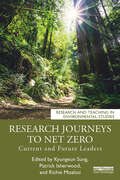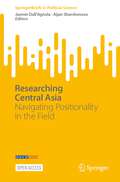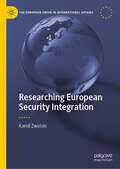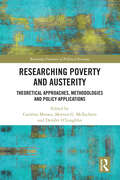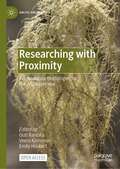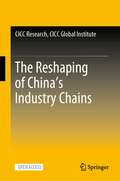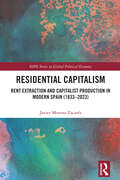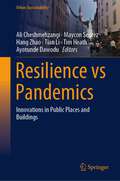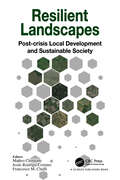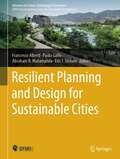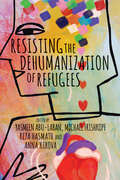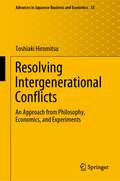- Table View
- List View
Religion, Human Rights, and the Workplace: Judicial Balancing in the United States Federal Courts and the European Court of Human Rights (ICLARS Series on Law and Religion)
by Gregory MoseReligious freedom is a fundamental and relatively uncontested right in both the United States and Europe. But other values like equality, justice, and the right to a private life are just as precious. Managing such conflicts has become a highly contested and politicized area of law and nowhere are such conflicts more evident – or more challenging – than those arising in the workplace. By comparing United States Federal Courts’ approach to free exercise in the workplace with that of the European Court of Human Rights, this book explores two very different methodologies for adjudicating rights conflicts. In examining methods and results, case by case, issue by issue and addressing each step of the analytical processes taken by judges, it becomes apparent that the United States has lost its way in the quest for equality and justice. It is argued here that while the European approach has its own flaws, its proportionality approach may offer vital lessons for United States practice. The book will make compelling reading for researchers, academics, and policy-makers working in the areas of law and religion, human rights law, constitutional law, and comparative law.
Religion, Mysticism, and Transcultural Entanglements in Modern South Asia: Towards a Global Religious History
by Soumen MukherjeeThis book explores the location of spirituality and mysticism in modern Indian religious and intellectual life. It examines select personalities and their ideas since the early twentieth century, their role in the interwoven spheres of socio-religious and political thought, and in burgeoning spiritual imaginaries, often at the intersection of academic and public discourse. As part of a global ecumene connected by affective bonds, these spiritual cosmopolitans often defied binary frameworks (East/ West; imperial core/ periphery; colonizer/ colonized), and in the upshot reappraised and recast the very concept of religion in response to overarching ‘this-worldly’ exigencies.
Religion-Regime Relations in Zimbabwe: Co-operation and Resistance (Routledge Studies on Religion in Africa and the Diaspora)
by Ezra Chitando Lovemore Togarasei Joram TarusariraThis book explores religion-regime relations in contemporary Zimbabwe to identify patterns of co-operation and resistance across diverse religious institutions. Using co-operation and resistance as an analytical framework, the book shows how different religious organisations have interacted with Emmerson Mnangagwa’s "Second Republic", following Robert Mugabe’s departure from the political scene. In particular, through case studies on the Zimbabwe Council of Churches, Zimbabwe Catholic Bishops Conference and Pentecostals, African Traditional Religions, Islam, and others, the book explores how different religious institutions have responded to Mnangagwa’s new regime. Chapters highlight the complexities characterising the religion-regime interface, showing how the same religious organisation might co-operate and resist at the same time. Furthermore, the book compares how religious institutions co-operated or resisted Mugabe’s earlier regime to identify patterns of continuity and change. Overall, the book highlights the challenges of deploying simplistic frames in efforts to understand the interface between politics and religion. A significant contribution to global scholarship on religion-regime interfaces, this book will appeal to academics and students in the field of Religious Studies, Political Science, History and African Studies
Religionspolitik und politische Religion in Japan und Europa: Debatten um Polytheismus, Nationalismus und Kolonialismus (Studien zu Literatur und Religion / Studies on Literature and Religion #8)
by Michael Mandelartz David WeißIn der neueren Debatte um das Wechselverhältnis von Religion und Politik hat Japan bislang keine Rolle gespielt; zu Unrecht, wie der vorliegende Band zeigt. Japan dürfte das einzige Land mit polytheistisch geprägter Kultur sein, das dem Imperialismus erfolgreich Widerstand entgegensetzte. Mit dem Aufstieg zur Kolonialmacht und der Erhebung des Shintoismus zur Staatsreligion stellte es die Denkmuster europäischer Überlegenheit infrage. Die polytheistische Religion sollte in diesem Transformationsprozess die historische Kontinuität des neuen Staates verbürgen. Dabei stimmen die rhetorischen Strategien überraschend genau mit dem Rückgriff der deutschen Romantik auf vermeintliche ‚Ursprünge‘ überein. Religiöse Symbolsprachen sind interpretationsoffen gegenüber politischen Deutungen, auch quer zur Unterscheidung von poly- und monotheistischen Religionen. Dies zeigt der Band in fünf Fallstudien von Germanisten und Japanologen.
Religious Organisations in Sub-Saharan Africa and South Asia: Connections to Society and the State (Routledge Research in Religion and Development)
by Carole RakodiThis book explores the links between religion, states, social welfare and social change in Sub-Saharan Africa and South Asia. Building on the author’s previous analysis of how religious beliefs, practices and values influence social behaviour and relationships, especially within families, this book focuses on the organisational characteristics of religions and societies. The book considers how Muslim, Christian, Hindu and Buddhist organisations working in different contexts express the religious values of charity and compassion in practical activities to improve social welfare. Drawing on extensive empirical research, the book maps the organisations involved, identifying the factors that explain their choice of activities, sources of funding and modes of organisation, and highlighting similarities and differences between the religious traditions. It considers the involvement of religious actors in school-level education, as well as in international humanitarian relief and reconstruction, and addresses the claim that religious organisations have distinctive features that give them comparative advantages. Finally, the book reviews research on the roles of religious values and organisations in resisting or promoting social change, focusing on women’s movements, especially their campaigns for changes in family law, and the quest for social and legal recognition for sexual and gender minorities. The book’s wide coverage of two subcontinents in the Global South and several important religious traditions will be of interest to researchers and students in the fields of sociology, international development, religious studies, anthropology and area studies, as well as to those engaged in policy and action who are looking to improve their understanding of the complex social, cultural, political and religious contexts in which they work.
Religious Responses to Pandemics and Crises: Isolation, Survival, and #Covidchaos (Routledge Studies in Religion)
by Sravana Borkataky-Varma, Christian A. Eberhart, and Marianne Bjelland KartzowReligious Responses to Pandemics and Crises explores various dimensions of the interrelations between the individual, community, and religion. With their global scope, the contributions to this volume represent reflections on the rich and multifaceted spectrum of human responses in a variety of different religions and cultures to the current SARS2-COVID-19 pandemic and similar crises in the past. The contributions are organized in three thematic parts focusing on strategies, rituals, and past and present responses to pandemics and crises. They reflect on the intersection of personal or communal responses and state-mandated policies relative to SARS2-COVID-19 while outlining different strategies to cope with the pandemic crisis. Timely questions explored include: How do individuals connect with or disconnect from religious and spiritual communities during times of personal and collective crises, including pandemics? How do religious practices such as rituals bridge individuals and communities? How do religious texts from past and present highlight and represent crises and pandemics? Dynamic and multidisciplinary in its inquiry, this volume is an outstanding resource for scholars of religion, theology, anthropology, social sciences, ritual theory, sex and gender studies, and contemporary medical science.
Religious Responses to Pandemics and Crises: Isolation, Survival, and #Covidchaos (Routledge Studies in Religion)
by Sravana Borkataky-Varma Christian A. Eberhart Marianne Bjelland KartzowReligious Responses to Pandemics and Crises explores various dimensions of the interrelations between the individual, community, and religion. With their global scope, the contributions to this volume represent reflections on the rich and multifaceted spectrum of human responses in a variety of different religions and cultures to the current SARS-2-COVID-19 pandemic and similar crises in the past.The contributions are organized in three thematic parts focusing on strategies, rituals, and past and present responses to pandemics and crises. They reflect on the intersection of personal or communal responses and state-mandated policies relative to SARS-2-COVID-19 while outlining different strategies to cope with the pandemic crisis. Timely questions explored include: How do individuals connect with or disconnect from religious and spiritual communities during times of personal and collective crises, including pandemics? How do religious practices such as rituals bridge individuals and communities? How do religious texts from past and present highlight and represent crises and pandemics? Dynamic and multidisciplinary in its inquiry, this volume is an outstanding resource for scholars of religion, theology, anthropology, social sciences, ritual theory, sex and gender studies, and contemporary medical science.
Remembering Colonialism in Zimbabwe (Routledge Studies in the Modern History of Africa)
by Ivan Marowa Ushehwedu KufakurinaniThis book examines the various ways in which colonialism in Zimbabwe is remembered, looking both at how people analyse, perceive, and interpret the past, and how they rewrite that past, elevating some players and their historical agency. Inspired by the ongoing movement on decoloniality, this book examines the ways in which generations of today question and challenge colonialism’s legacies and their role in Zimbabwe’s collective memories and history. The book analyses the memorialising of both Mugabe and Mnangagwa in their speeches and during the political transition, before going on to trace the continuing impact of colonialism across areas as diverse as dress code, place-naming, agriculture, religion, gender, and in marginalised communities such as the BaKalanga. Drawing on the expertise of Zimbabwean scholars, this book will appeal to researchers of decolonisation, and of African history and memory.
Remembering Mass Atrocities: Perspectives on Memory Struggles and Cultural Representations in Africa (Palgrave Macmillan Memory Studies)
by Mphathisi Ndlovu Lungile Augustine Tshuma Shepherd MpofuThis book explores how popular cultural artifacts, literary texts, commemorative practices and other forms of remembrances are used to convey, transmit and contest memories of mass atrocities in the Global South. Some of these historical atrocities took place during the Cold war. As such, this book unpacks the influence or role of the global powers in conflict in the Global South. Contributors are grappling with a number of issues such as the politics of memorialization, memory conflicts, exhumations, reburials, historical dialogue, peacebuilding and social healing, memory activism, visual representation, transgenerational transmission of memories, and identity politics.
Remembering the War, Forgetting the Terror: Appeals to Family Memory in Putin's Russia (Rhetoric and Democratic Deliberation)
by Ekaterina V. HaskinsRussian state propaganda has framed the invasion of Ukraine as a liberation mission by invoking the Soviet-era myth of the Great Patriotic War (1941–45), in which the Soviet people, led by Russia, saved the world from the greatest evil of the twentieth century. At the same time, the Russian government has banned civil society institutions and initiatives that remind the country of the legacy of Soviet political violence.Remembering the War, Forgetting the Terror explores the appeal of the cult of the Great Patriotic War and the waning public interest in Soviet political terror as intertwined trends. Ekaterina V. Haskins argues that these developments are driven not only by the weaponization of the official memory of World War II but also by familial pieties and deep-seated habits of memory. Haskins uncovers how widely shared practices of remembrance have taken root and flourished through recurring exposure to war films, urban environments, popular commemorative rituals, and digital archives. Combining scholarship and personal biography, Haskins illuminates why, despite the staggering toll of World War II and internal political violence on Soviet families, most Russian citizens continue to proudly embrace their family’s participation in the war effort and avoid discussion of domestic political persecution. Elegantly written and convincingly argued, this book is an important intervention into contemporary rhetoric and memory studies that will also appeal to broader audiences interested in Russia, Eastern Europe, and the war in Ukraine.
Remodelling to Prepare for Independence: The Philippine Commonwealth, Decolonisation, Cities and Public Works, c. 1935–46
by Ian MorleyRemodelling to Prepare for Independence: The Philippine Commonwealth, Decolonisation, Cities and Public Works, c. 1935–46 illuminates the implications of the USA’s final phase of colonial rule in the Philippine Islands. It explores the Filipino side of decolonisation and the management of the built environment in the years immediately prior to self-rule. This book shakes off the collaboration vs. resistance paradigm that empire histories generally follow and consequently yields an original vantage point to comprehend transition within an Asian society in the years immediately prior to, during, and after World War Two. This will not only deepen insight of the American Empire, but also grants the opportunity to tie Philippine political-cultural change to the global history of urban planning’s advancement. Accordingly, it opens a new window to rethink Filipino ethno-history and societal evolution, alongside the opportunity to compare the Philippines with other nations that undertook planning projects as part of their decolonisation process and early-postcolonial advancement. The book utilises theoretical frames in order to help creatively excavate the era 1935–46 for the purpose of not just revealing what public works occurred, but to also uncover what those projects meant to the Commonwealth Government, the BPW’s staff, and the public who benefitted from public works projects. The book will be relevant to students and researchers of Urban History, Asian and American (Empire) History, and Imperial and Colonial Studies. Architects, planners, and members of the public who are interested in the form and meaning of urban environments designed/constructed in the past will also find the publication to be of great interest.
Report on the Chinese Business Environment Survey 2020 (Research Series on the Chinese Dream and China’s Development Path)
by Xianxiang Xu Qingmiao Bi Li ZhangThis book provides quantitative indicators covering four main areas of business environment in China. The most distinguished feature of this book is that it evaluates Chinese business environment from the perspective of enterprises based on two years' nationwide survey, interviewing 15,000 enterprises in 300 One-Stop Shops across China from 2018 to 2019, which includes: (1) Progress of Chinese business environment in 2019; (2) overview of the facilities and services of China's One-stop Shops; (3) construction and popularity of Chinese digital government system; (4) the effect of Chinese business environment on improving economic performance in terms of entrepreneurship, innovation, and economic growth. The quantitative analysis of this book shows that in 2019, China made noteworthy improvements in the process of reducing permits, increasing the availability of digital government, and improving the government efficiency. Challenges such as uneven progress among sub-regions and difficulties for small enterprises to grow were still getting in the way. The goal of the book is to provide objective data and cases from enterprise survey for use by academics and governments. This book presents Chinese experiences of designing sound business regulatory policies.
Reputational Security: Refocusing Public Diplomacy for a Dangerous World
by Nicholas J. CullWe are living in turbulent times, witnessing renewed international conflict, resurgent nationalism, declining multilateralism, and a torrent of hostile propaganda. How are we to understand these developments and conduct diplomacy in their presence? Nicholas J. Cull, the distinguished historian of propaganda, revisits the international media campaigns of the past in the light of the challenges of the present. His concept of Reputational Security deftly links issues of national image and outreach to the deepest needs of any state, rescuing them from the list of low-priority optional extras to which they are so often consigned in the West. Reputational Security, he argues, comes from being known and appreciated in the world. With clarity and determination, Cull considers core tasks, approaches, and opportunities available for international actors today, including counterpropaganda, media development, diaspora diplomacy, cultural work, and – perhaps most surprisingly of all – media disarmament. This book is crucial for all who care about responding to the threat of malign media disruption, revitalizing international cooperation, and establishing the Reputational Security we and our allies need to survive and flourish. Reputational Security is enlightening reading for students and scholars of public diplomacy, international relations, security studies, communications, and media, as well as practitioners.
Research Journeys to Net Zero: Current and Future Leaders (Research and Teaching in Environmental Studies)
by Kyungeun Sung Patrick Isherwood Richie MoalosiThis book provides useful insight into how academics from diverse disciplinary backgrounds, such as science, engineering, technology, social science, policy, design, architecture, built environment, business, and management, have been conducting research into how to realise net zero emissions to address climate change. This book explores the ways in which countries around the world have pledged to achieve net zero emissions through decarbonisation processes. It presents the highest calibre research and impact activities carried out in the UK, Europe, North America, Australia, Asia, and Africa. Such activities include conceptualisation, opportunity identification, specific case studies, demonstration of proof of concepts, provision of evidence, education of the general public, and knowledge transfer to companies. Further to this, the chapters also bring to light personal career journeys to net zero by current and future international research leaders. From this book, readers will gain a full understanding of net zero research via multiple disciplinary pathways, be inspired by personal accounts, and will learn key methodologies, including quantitative and qualitative approaches. The diversity of authors and topics make the book widely applicable to a range of fields, and it will be of great interest to researchers, students, practitioners, and decision makers working towards the goals of net zero and decarbonisation.
Researching Central Asia: Navigating Positionality in the Field (SpringerBriefs in Political Science)
by Jasmin Dall’Agnola Aijan SharshenovaThis open access book explores some of the struggles and challenges that researchers and practitioners face when conducting research in the Central Asian research setting. Written for scholars still in the planning stages of their research, it addresses key questions, including: How shall we problematize and reconceptualize the concept of positionality through lenses of local voices from the region? How does practitioners’ and scholars’ positionality contribute to their experiences of inclusion, exclusion, and access to the field? How do scholars navigate issues of personal safety and mental well-being in the more closely monitored societies of Central Asia? The book includes contributors from both Central Asia and Western countries, paying particular attention to the ways researchers’ subjectivity shape how they are received in the region, which, in turn, influences how they write about and disseminate their research. In featuring an even greater variety of voices, this book fills an important gap in the literature on field research and knowledge production in and on Central Asia.
Researching European Security Integration (The European Union in International Affairs)
by Kamil ZwolskiThis book provides new and established researchers with innovative methodologies and research strategies to explore European security integration from a different perspective, challenging traditional theoretical interpretations. It takes a step back from well-established theoretical approaches to the European Union’s (EU) Common Foreign and Security Policy (CFSP) and Common Security and Defence Policy (CSDP) to ask more fundamental questions about the core assumptions underpinning research on European security integration. It supports methodological innovations with an analysis of the most significant empirical problems of European security governance, including the war in Ukraine or the role of Russia in European security. In the last chapter, the author offers ideas for new pedagogical approaches to teaching European Studies.
Researching Poverty and Austerity: Theoretical Approaches, Methodologies and Policy Applications (Routledge Frontiers of Political Economy)
by Caroline Moraes Morven G. McEachern Deirdre O’LoughlinPoverty is a complex global challenge rooted in intertwined social, economic and political factors, which excludes people from participating fully in normalised social and market-based activities. The COVID-19 pandemic has exacerbated poverty-related issues such as food insecurity, and growing numbers of people are having to rely on welfare assistance. This pandemic, coupled with austerity measures implemented across many European countries over the past years, has impacted negatively on towns, cities, regions and countries, leaving places and communities depleted. This edited volume curates a collection of relevant research addressing the challenges of poverty and the political-economic measures that perpetuate it. It adopts a cross-disciplinary approach to covering relevant theories, methodologies and policy-oriented research, highlighting the interlinkages between poverty and austerity that have resulted since the 2008 financial crisis. In particular, the book focuses on food insecurity as one of the most extreme manifestations of poverty but also addresses interconnected issues such as unemployment, homelessness and poor health. The contributors primarily utilise diverse qualitative methods that give voice to lived experiences of poverty while also considering quantitative approaches that are essential for measuring food insecurity and modelling the impacts of austerity. The book will be of significant interest to anyone researching poverty and austerity with an interest in social policy, human and cultural geography, marketing and consumer culture, economic policy, public health and sustainability.
Researching with Proximity: Relational methodologies for the Anthropocene (Arctic Encounters)
by Outi Rantala Veera Kinnunen Emily HöckertThis open access book presents a series of speculative, experimental modes of inquiry in the present times of environmental damage that have come to be known as the age of the Anthropocene. Throughout the book authors develop more nuanced ways of engaging with the environmentally vulnerable Arctic. They counter distancing, exoticising, and even apocalyptic imaginaries of the Arctic by staying proximate with mundane places and beings of the north. The volume engages and plays with familiar tourism concepts, such as hospitality, visiting, difference, care, openness, and distance, while expanding the focus from binary and human-centric approaches of hosts and guests to questions of wellbeing among multispecies communities. The transdisciplinary group of contributors share a curiosity about how staying proximate may provide theoretical depth and epistemological openings to attend to current tensions and to diversify the ways we do and enact research. Thus, each chapter provides a methodological experiment with proximity, developing diverse ways of envisioning and storying more-than-human worlds.
The Reshaping of China’s Industry Chains
by CICC Research, CICC Global InstituteThis open access book offers a comprehensive analysis of the opportunities and challenges facing the development of China’s industry chains in a changing landscape. As the trend of deglobalization is intensifying, the global supply chain has suffered from external shocks, prompting both the private and public sectors to reflect on the stability of the supply chain. As such, governments are putting greater emphasis on the resilience and “security” of industry chains. How will the changing circumstances across the globe affect China’s industry chains? This book suggests that amidst the trend of deglobalization, it is important for China to leverage its advantages in economies of scale to improve both the efficiency and security of industry chains. By examining the current state of global trends, international trade, and industrial policies, the book outlines potential pathways of the development of global supply chains, and provides insights on the challenges and opportunities for China. This book also focuses on strategically important sectors in the digital, green, logistics, and manufacturing industries, presenting an in-depth discussion of the prospects of each industry chain. Being both readable and academically rigorous, this book is well-suited for readers from in the fields of public policy, economics, finance, and for those who seek to better understand the reshaping of China’s industry chains. The work cites information from various sources, including academic journals, policy institutions, and a network of primary sources such as industry experts and renowned academics.
Residential Capitalism: Rent Extraction and Capitalist Production in Modern Spain (1833–2023) (ISSN)
by Javier Moreno ZacarésOver the last decade, Spain has become an emblem of the contradictory relationship between capitalism and housing. During the house-price boom of the 2000s, Spain built homes on an unprecedented scale, with output levels that overshadowed those of every major European economy. Nevertheless, when the fortunes of real estate markets turned, a wave of repossessions ensued, and a massive number of households were thrown out into the street as a sizeable portion of the housing stock was lying vacant. In turn, the implosion of Spanish residential capitalism triggered an intense wave of unrest that has come to shape a decade of political turmoil.This book uses the Spanish case to bring to light, and theorise, the workings of residential capitalism. The author traces the evolution of residential provision from the nineteenth century to the present, situating the transformation of the housing market in a context of ongoing social change and conflict. The book shows how the present needs to be understood by looking at the historical process through which residential provision became subsumed under the logic of capitalist accumulation but also at a long genealogy of struggles around urbanisation and housing, the outcomes of which remain crystallised in Spain’s urban institutions. The author reveals how both residential capitalist development and urban social conflict have constituted each another, casting light on the historical relationship between housing crises, urban unrest, and the evolution of real estate markets. The book develops a historicist framework to understand residential capitalism, an important contribution for an age in which real estate markets have come to determine the rhythms of global capital.Addressing key issues and debates in the field, including the financialisation of housing, the politics of scale and urban entrepreneurialism, the political economy of the Eurozone, and the history of capitalist development, this book will be of great interest to students and scholars of political economy, as well as those engaged in crossover fields such as housing studies, urban geography, or financial geography.
Resilience vs Pandemics: Innovations in Public Places and Buildings (Urban Sustainability)
by Ali Cheshmehzangi Maycon Sedrez Hang Zhao Tian Li Tim Heath Ayotunde Dawodu“Resilience vs Pandemics: Innovations in Public Places and Buildings” explores innovative solutions for architecture and public places during and after the pandemic. Additionally, the authors contribute to the documentation of architectural and social transformations that have been prompted by previous transmissible diseases, as this knowledge can inform responses to future pandemics. In this volume, the chapters present critical, exploratory, multi- and interdisciplinary, and cutting-edge research approaches; with a particular focus on the effects of COVID-19 and other highly transmissible diseases on the design, use, performance, and perception of the built environment, particularly at the building scale. This volume aims to organize a collection of scientific studies, reviews, analysis, recommendations, and solutions in the fields of urban design, architecture, design, landscape design, etc. The overarching goal is to document new approaches to create and enhance built environment resilience. Chapters shed light on novel methods, tools, processes, regulations, behaviours, and other relevant details contributing to a comprehensive understanding of this crucial issue. The two scales of the built environment under consideration are: (1) Public Places, including research on transformations (death, emergencies, changes), requirements, adaptability, usability, virtual immersion, historical perspectives, interactivity, shifts in use and programs, etc.(2) Buildings, including regulations, shifts in use and program, non-pharmaceutical interventions, human interactions, and human-machine interfaces. The book covers a wide range of studies, including physical and non-physical studies, which may refer to the city infrastructure, green/blue spaces, housing, policy-making, health services, social and economic issues, etc. The findings and results of various global case study examples contribute to the decision-making of governments, organizations, and institutions, as well as inspire scholars and future research for developing resilience in the post-pandemic era.
Resilient Landscapes: Post-crisis Local Development and Sustainable Society
by Matteo Clemente Jesús Rodrigo-Comino Francesco M. ChelliIn recent years, resilient districts have become territorial contexts for projects designed to respond to the needs of local communities, through the exploitation of landscape peculiarities to overcome the economic crisis. This volume offers a comprehensive insight on sustainable development of local territories. It recommends the planning of local interventions through the integration of sustainable development with resilience of local systems. The chapters originate from either individual or collective work independently conducted, but at the same time integrated by scholars from different academic backgrounds, among which environmental and agrarian sciences, social and economic disciplines, and urban planning and landscape design are included.
Resilient Planning and Design for Sustainable Cities (Advances in Science, Technology & Innovation)
by Francesco Alberti Paola Gallo Abraham R. Matamanda Eric J. StraussThis book discusses a crucial paradigm shift in urban planning and architectural design, addressing the urgent need for sustainability and adaptation in the face of rapidly changing climate and urban landscapes. Ideal for urban planners, architects, researchers, and policymakers, this book weaves together cutting-edge research and innovative applications from the 7th edition of the international conference on Urban Planning and Architectural Design for Sustainable Development organized by IEREK in collaboration with the Architecture Department at the University of Florence, Italy. Through a collection of double-blind peer-reviewed papers, it offers a cohesive narrative emphasizing the vital role of spatial design at all scales. Readers will explore diverse case studies, from bustling megacities to forgotten villages, showcasing the local impacts of global challenges and the efforts to prevent, neutralize or mitigate them. With an insightful blend of qualitative and quantitative methods, the book uncovers the multi-functionality of blue-green infrastructure, the potentials of urban voids, and the urgent need for ecological transition. Unveiling the gap between current governance instruments and pressing challenges, this book serves as a compass for crafting inclusive, livable, and environmentally conscious cities and communities.
Resisting the Dehumanization of Refugees
by Reza Hasmath Yasmeen Abu-Laban Anna Kirova Michael FrishkopfRefugees face distinct challenges and are often subject to dehumanization by politicians, media, and the public. In this context, Resisting the Dehumanization of Refugees provides urgent insights and policy relevant perspectives to improve refugees’ social well-being and integration. Taking a transdisciplinary approach, scholars from the social sciences, arts, and humanities, alongside practitioners and refugees, explore what it means to experience dehumanization. They consider how refugees’ experiences of dehumanization inform both epistemological and practical approaches to humanizing (or re-humanizing) refugees before, during, and after resettlement. By addressing these important issues, contributors marshall rich and multidimensional responses that draw upon our shared humanity and reveal new possibilities for change.
Resolving Intergenerational Conflicts: An Approach from Philosophy, Economics, and Experiments (Advances in Japanese Business and Economics #33)
by Toshiaki HiromitsuThis book is an unprecedented consideration of the challenges of what we can do for generations yet to come. Many growing intergenerational conflicts of interest, such as climate change and fiscal sustainability, are the result of the historically new progress of increasing human power, and the resolution of those conflicts demands a new intergenerational ethic. The book offers fresh new ideas for resolving intergenerational conflicts through the exploration of an entirely new field, conceptualized in philosophy, developed in economics, and tested in experiments. In particular, this work develops the theory of intergenerational cooperation based on a new relationship of direct reciprocity between generations. From experimental results, the possibility of intergenerational cooperation through Kantian categorical imperative is shown. The book also examines the effectiveness of inviting representatives of future generations, which are called "imaginary future generations", into the deliberations for current policy decisions. The original Japanese edition of this book was awarded the 66th Nikkei Prize for Excellent Books in Economic Science. The prize was established in 1958 to contribute to the advancement of academics and knowledge in the fields of economics, management, and accounting, as well as to its general dissemination and application.
